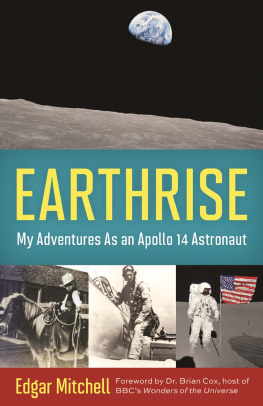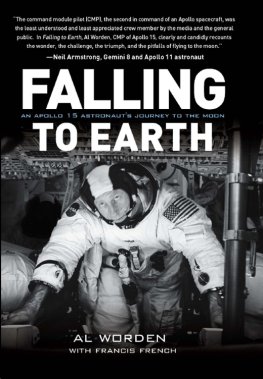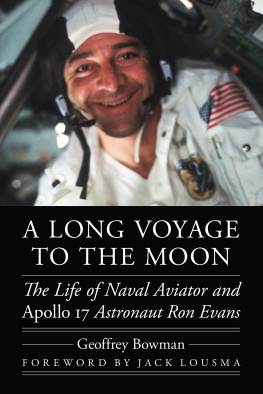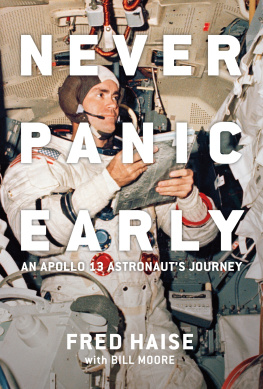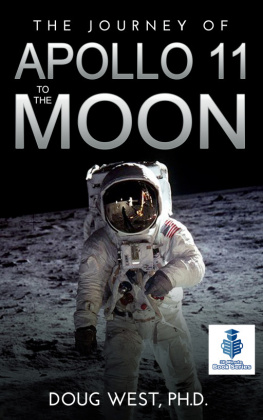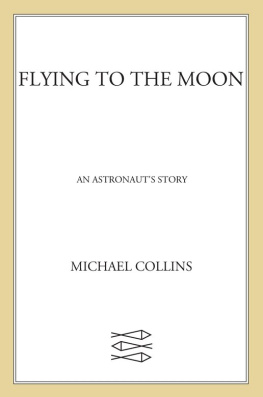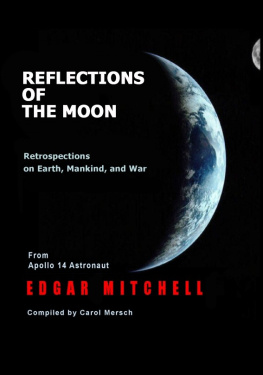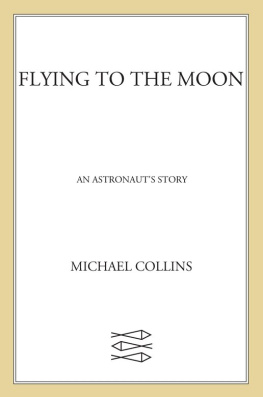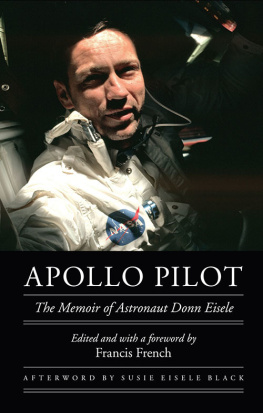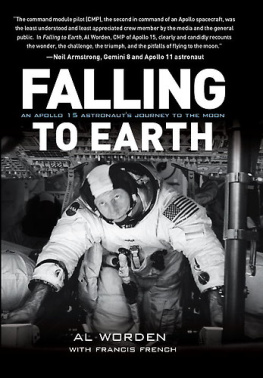O n February 5, 1971, Edgar Mitchell jumped off the last rungs of a ladder connecting him to NASAs Antares spacecraft and landed with two feet on the Moon. Following the disastrous Apollo 13 mission, Mitchell was one of three astronauts to successfully complete the Apollo 14 journey to the Moon, though it wasnt without its own alarming moments.
In Earthrise, Edgar recalls his spectacular trip to the Moon and the life experiences that got him there, including his early days spent in Roswell, New Mexico, amid nuclear testing and the rumored UFO crash; his first solo airplane flight as a young teen; his time as a navy combat pilot; and becoming a NASA astronaut. With fascinating detail, Edgar describes what it was like to launch into space and land on the Moon, illuminating everything from the practicaleating, sleeping, and going to the bathroom in spaceto the mystical, life-changing experience of gazing at Earth from afar.
With illuminating sidebars, transcripts of NASA recordings from the historic Apollo 14 mission, and extensive resources including lists of space-related websites, museums, organizations, films, and books, Earthrise is an invaluable addition to any space, astronomy, or science buffs bookshelf.
Copyright 2014 by Edgar Mitchell and Ellen Mahoney
All rights reserved
Foreword 2014 by Brian Cox
All rights reserved
Published by Chicago Review Press Incorporated
814 North Franklin Street
Chicago, Illinois 60610
ISBN 978-1-61374-901-2
Library of Congress Cataloging-in-Publication Data
Mitchell, Edgar D.
My adventures as an Apollo 14 astronaut / Edgar Mitchell with Ellen Mahoney; foreword by Dr. Brian Cox.
pages cm
Audience: Age 12+.
Audience: Grades 7 to 8.
Includes bibliographical references and index.
ISBN 978-1-61374-901-2 (cloth)
1. Mitchell, Edgar D.Juvenile literature. 2. AstronautsUnited StatesBiographyJuvenile literature. 3. Project Apollo (U.S.)Juvenile literature. I. Title.
TL789.85.M57A3 2014
629.454dc23
2013037858
Interior and cover design: Sarah Olson
NASA transcripts courtesy of NASA Historical Reference
Collection, Washington, DC
Printed in the United States of America
5 4 3 2 1
Contents

Index
Foreword

I was 23 months old when Edgar Mitchell walked on the Moon. I watched it live on TV, according to my dad, and perhaps this is one of the reasons why I have always thoughtknown, in factthat the Apollo program remains humanitys greatest achievement, despite half a lifetime of engineering and scientific progress.
There are many reasons I know this, and you will read about them all in this book. In purely engineering terms, the goal set by John F. Kennedy in 1961 to land an astronaut on the Moon within a decade was more than ambitious, only 58 years after Orville Wright flew the first powered aircraft. Perhaps it could only have been achieved by a nation founded by explorers: Ten years to the Moon? I took it as a personal challenge, writes Edgar Mitchell. We have all benefited from the technologies and techniques developed during the Apollo years, in aviation and countless other fields.
But there is a deeper reason to celebrate the spirit of Apollo: exploration is vital to human survival. This simple fact is often overlooked in an age where some see space flight as an unaffordable luxury. The great chemist Sir Humphry Davy made the case for the expansion of our physical and intellectual domain at the turn of the 19th century, just as the benefits of the Industrial Revolution were beginning to emerge. Nothing is so fatal to the progress of the human mind as to suppose that our views of science are ultimate; that there are no mysteries in nature; that our triumphs are complete; and that there are no new worlds to conquer.
This book is the story of how a young farm boy from New Mexico learned these lessons firsthand by flying to the Moon and looking back at our home planet from a distance of a quarter of a million miles. Edgar Mitchell describes eloquently how his experiences in war caused him to look for a peaceful way to use his piloting skills, and how his flight aboard Apollo 14 changed his view of human possibility and progress. These are two of the most extreme experiences imaginable. The first none of us would wish to share, but the second I personally would have loved, although I am sure it takes a special kind of explorer to climb aboard the Saturn V, to this day the most powerful flying machine ever built.
The most fascinating thing for me about this book is the insight it delivers into the personality of such an explorer, and how that personality changed as a result of a grand adventure beyond Earth. If only our leaders could see Earth from space, writes Mitchell, wed have different economic and political systems here on Earth. I have never had that privilege, but my own experience in thinking about the origins and evolution of our universe and the natural laws that govern it leads me to a similar conclusion. Perspective is the key. It is far too easy for our societies to become myopic, gazing at the ground rather than the stars. Science, engineering, and exploration force us to look upward and outward, and I do not think it is idealistic or clich to dream of a civilization that values these pursuits significantly more than we do today.
The Apollo program, more than any other human endeavor, demonstrated what is possible when we merge our scientific and engineering creativity with our powerful instinct to see beyond the horizon. Edgar Mitchells book is a fascinating insight into the mind of one of those explorers, and the story of how his vision for the future was shaped by a voyage to the Moon.
DR. BRIAN COX is a professor of particle physics and Royal Society University Research Fellow at the University of Manchester School of Physics and Astronomy, Manchester, England. He presents various space and science programs on BBC (British Broadcasting Corporation) radio and television, including Wonders of the Universe.
INTRODUCTION

Trouble on the Far Side
Courage is resistance to fear, mastery of fearnot absence of fear. Mark Twain
F ebruary 5, 1971, was no ordinary Friday. In fact, it was one of the most extraordinary days for planet Earth. There was a great deal of excitement on Earth, as well as nearly 240,000 miles away in space. Two humans were about to walk on the Moon, and I was one of them.
I was part of the historic Apollo 14 Moon mission along with astronauts Alan Shepard and Stu Roosa. Alan was Commander of the flight, Stu was the Command Module Pilot, and I was the Lunar Module Pilot. As astronauts, we were all part of NASA, the National Aeronautics and Space Administration program in the United States. Stu and I were rookie astronauts and wed been training for years for this important Moon mission. Alan was already famous all over the world as the very first American to fly into space.
Just five days earlier, an enormous Saturn V rocket had blasted us out of Earths orbit and into space from the Kennedy Space Center in Florida. And now, as we soared toward the Moon, our home away from home was the Command Module (CM), a large high-tech spacecraft Stu had named the Kitty Hawk in honor of the Wright brothers first flight in Kitty Hawk, North Carolina.
Next page
